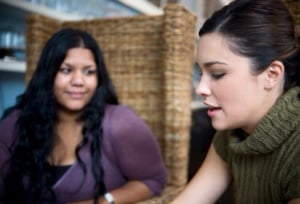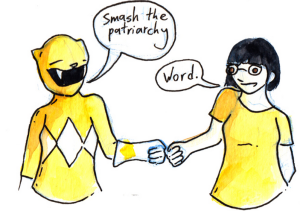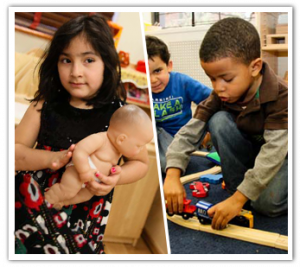Last November’s trending #ThanksgivingWithBlackFamilies hashtag had me rollin’.
Black Twitter really outdid itself, capturing the Black holiday experience with everything from your auntie and mama’s mac ‘n’ cheese wars to the proud moment when you graduate from the kids’ table.
However, after I wiped away my giggle tears, I noticed there were some problematic memes – shaming fat family members, stereotyping queer folks, and reinforcing patriarchal norms – just to name a few.
But dammit, this was supposed to be fun. Everyone was just trying to have a good time, and I was over here embodying my own hashtag: #WhenYourWokenessRuinsAGoodTime.
That moment was part of many of our experiences that we don’t really talk about.
What happens when you’ve been immersed in social justice work, committed to changing the world to fight for yourself and your community, and then you spend time with a family that’s not as engaged with social justice as you?
Or worse – a family that actively upholds oppression with things like respectability politics, internalized racism, and patriarchal norms.
What am I supposed to do – interrupt the mac ‘n’ cheese battle to say, “Hey y’all, have you noticed the women in this family are doing most of the domestic labor? Let’s have uncle make the mac ‘n’ cheese next year.”
I’d probably get punted back to the kids’ table and have my mac ‘n’ cheese vote taken away.
It may be difficult to speak to your family about disheartening or controversial issues related of oppression – especially when everyone’s just trying to have a good time.
Your loved ones’ usual approach to difficult issues might be to deal with them on your own without asking for help. To pray about it, but not talk about it. To treat emotions as a sign of weakness.
But as someone who’s working to fight these issues, you actually have a great opportunity when it comes to your family. You can bring the fight against anti-Black racism and its connections to other forms of oppression to our dining tables, living rooms, and porches.
You have the power to transform casual conversations into opportunities to center our family’s lives as we move toward liberation.
These transformations are particularly important – and particularly daunting – for those of us with multiple marginalized identities. From the intersections you inhabit as a Black woman, or a Black queer person, or Black disabled person, you bring an essential and unique perspective to our movements.
With these oppressive systems weighing on you, you’d have to go against long-standing family norms to bring up topics around oppression – and that’s hard to do.
But when we don’t create space in our lives to talk about our struggles, we can suffer from internalized racism, self-blame, and shame.
Maybe there’s already space in your family gatherings to talk about the impact of racism. Maybe you’ll have to be the one to initiate the conversation. Maybe your family discusses racism, but not how it intersects with your sexual or gender identity.
Whatever the case, your perspective can help build and strengthen your family’s capacity to address difficult issues together.
We can have cross-generational learning, honoring the wisdom of elders and youth, and showing that uncle who only looks to you for computer help that you have deeper knowledge to share. We can push conversations to include Black women and girls who are so often left out of focus, and to make clear that when we say “Black Lives Matter,” we must include Black queer lives, and Black trans lives, and Black gender nonconforming lives.
And for your own sake, you deserve to have space for your whole self – your whole woke self, even the parts your folks call “too radical” with an exasperated eye roll – when you’re with your family. You shouldn’t have to choose between your passion for social change and your time with your loved ones.
But it may not be easy. So before you risk losing your seat at the grown folks’ table, let’s talk about what gets in the way of having these conversations. Then we’ll have some tips that can help you move through the obstacles.
Why Talking Anti-Black Racism with Family Can Be Hard
Talking about sensitive issues around oppression with your family is unlike conversations you might have with classmates or strangers.
After all this is your fam – people you ride hard for, who shaped you into you are today, who might have your back at any other time – and if it’s hard for them to talk about emotional subjects, you might not want to push them.
If things get contentious, it could damage your relationship. What if your conversation is with an uncle who sees you as sweet and naïve, or an elder who expects you to defer to him as a sign of respect, or an in-law you don’t want to argue with?
There are lots of potential factors that could make this a difficult conversation, and here are some of the challenges you might expect:
1. It Can Add Stress to a Happy (Or Already Stressful) Time
Family reunions, holiday dinners, summer barbeques – whether you anticipate having a joyous, carefree time with your family or one full of drama, talking about controversial issues can add unwelcome stress and feel like an emotionally draining burden.
It makes sense if you’re worn out from the daily battles throughout the rest of the year, and you need to take care of yourself when it comes to these conversations.
The good news is that you can take care of yourself – centering your needs as a Black person affected by racial injustice is part of the work.
2. Coming Out Strong Against Oppression Can Make You Feel Isolated
There’s nothing like insisting on talking about racism to bring down the joy, is there? If this isn’t a conversation your family’s already having, you can feel like an outlier for bringing it up.
Many families do already talk about these issues, so continuing or deepening those conversations wouldn’t be much of a stretch. But in other families, addressing oppression means taking everyone out of their comfort zones.
That uncle who sees you as sweet and naïve might change his perception once you challenge him when he victim-blames the women who were assaulted by Bill Cosby.
Your perspective can leave you open to being scrutinized and ostracized.
3. Trauma – On All Sides
Healing is one of the main goals of creating space for racial justice conversations with family. But the trauma so many of us carry might make it really difficult to start talking about racial justice in the first place.
Because we often have a lot of love for family, it’s understandable to want to take extra care around your loved ones’ pain.
If you’re talking about police brutality and someone derails the conversation to address “black on black crime,” you’d probably address her statement gently if you knew she’s lost a child to gang violence.
But it also wouldn’t be easy for you to let that statement go if you’re carrying the trauma of police violence and she starts blaming the Black community for that. The need for healing on all sides of this conversation would make this a delicate situation, and it’s important to recognize the root of what’s going on.
4. Your Other Marginalized Identities Can Be Targeted for Attack
You haven’t seen your cousins since you came out as genderqueer, or you still haven’t gotten around to telling your grandmother you’re trans. Your mom thinks your asexuality is a “white people thing,” or your older brothers don’t get why you prioritize womanism as part of your identity.
Whatever your case may be, if you’re part of another marginalized group in addition to being Black, unsupportive family members can make talking about oppression even more of a challenge. They could make an uncomfortable situation worse by attacking you.
You don’t have to put your own safety or familial stability at risk if that’s not the right choice for you. If you make the choice to stand up for your communities and communities you love, you deserve to have support and self-care available when you do so.
5. Other Folks Might Not Have the Same Understanding of Racism As You
You’re probably familiar with white folks’ tendencies to deny the impact of racism, and unfortunately, white supremacy’s influence can bring up similar challenges with your family.
As Black folks, even we can internalize racist thinking and fall for self-blaming messages that say we’re the ones at fault for our struggles.
Many people still believe that racism only looks like belonging to the KKK, and that other white folks can’t benefit from and contribute to white supremacy in other ways.
Or your family may be well aware of how racism affects their daily lives – but they wonder, “Do we really have to talk about it?” And they wish you’d just shut your mouth and enjoy the barbeque.
It takes a lot of work to undo these toxic ideas – it’s not going to happen over the course of one dinner, so it can feel daunting to even try.
6. Conversations Can Get Toxic When They Center on Whiteness (Yes, Even When White Folks Aren’t Around)
White supremacy is a self-centered beast. Whether you spend your holidays with white in-laws, mixed race family members, or all-Black family, it’s possible for conversations on race to center whiteness in damaging ways.
It’s so tiring to feel constantly responsible for taking care of white feelings – whether they’re actually in the room or in the form of Black folks policing ourselves and each other to cater to whiteness through respectability politics.
It can feel hard to move away from centering whiteness, especially when the topic is racism perpetuated by white supremacy.
But it’s not impossible – and it’s important for us to lift up our own communities, celebrate our strategies for looking out for each other, and take care of ourselves as we do this difficult work.
How to Have the Best Possible Racial Justice Conversations with Your Family
I don’t want you to have to spend your family barbeque eating your potato salad alone on the park swings.
So now that we’ve got the challenges all out on the table, let’s talk about how to actually have these conversations in effective and self-sustaining ways.
Here are some strategies to think about as you prepare:
1. Believe in What You Bring to the Conversation
Depending on who you are and what your role is in your family, it may be hard for you to believe in what you have to say about contentious issues.
If your family is used to you being the clown, or the young one who defers to the elders, or a woman who lets men speak over her, it’s time to let them get to know more of who you are.
Asking for respect includes more than claiming your seat at the grown folks’ table.
Trust your voice.
We all still have a lot to learn and we’re learning more every day, but you’re the expert in your own life, so you can speak strongly from your own experience.
2. Pick Your Battles – And Know You Don’t Have to Take Them All On
While it’s great to be empowered to say what needs to be said, you’re also not obligated to take on all of the necessary work yourself.
There will be plenty of opportunities to talk oppression – when the cheerleaders are all white in the NBA game on TV, when someone describes young Black men as “thugs,” when a person from the white side of the family stereotypes someone from the Black side.
If you’re on alert for every possible opportunity, you might miss out on a second helping at dinner, and other chances to enjoy the holiday.
So give yourself permission to pick your battles. Only you know best for yourself when it’s not worth having a potentially emotional discussion.
3. Pull Other People in to Help You Out
You don’t have to carry this work alone. Think about if other family members can help you carry it.
It’s heartbreaking to feel isolated as the only one who cares about injustice – but if you think about it, you may have more comrades than you think. Even some of the family members who haven’t attended as many Black Lives Matter rallies as you have can bring their own perspective about why these issues are important.
Casually racist mother-in-law? Tell your white partner you need them to call her in. Sister engaging in respectability politics? Give your newly-woke niece the chance to use her new vocab words to tell her what’s up.
You could coordinate with a cousin to facilitate a racial justice conversation after dinner.
If there’s support available, don’t be afraid to use it. That can make a big difference in helping you avoid feeling isolated and alone.
4. Create Points of Reference to Lead People to Connect the Dots on Their Own
You won’t be able to address everything in one conversation, and you shouldn’t have to feel the pressure to try.
One way to alleviate some of that pressure is to give people some basic things to refer to, and then let them do the work on their own.
For instance, if you plant a seed for your grandfather to consider why people with uteruses in the Black community need access to safe abortions, then maybe someday in the future you can make a parallel with something he cares about.
When he opposes cops policing Black women’s bodies, he might come to understand why cisgender women need to be able to make their own reproductive choices as another way to control their own bodies.
Everyone has to do their own work in learning about how oppression works, and you can draw some lines to help them get there.
5. Use a Note to Explain Yourself Fully
Since it’s impossible to cover everything about oppression in one conversation, it might be helpful to write a note later to explain a little more.
That way, you can say what you need to say all at once, without being interrupted or having the conversation escalate. You also don’t have to feel like it’s on you to interrupt the joy of family time by bringing the mood down – this is an option to avoid being accused of being “too serious” if it’s going to lead people to dismiss what you have to say.
Include links in an email or print out copies of articles to read for further learning. You can also include statistics, like showing that the rates of “black on black crime” are no different from other groups, so they can read them and learn at their own pace.
6. Save Deeper Conversations for One-on-One Time
Think of this discussion as a start to a larger conversation. Another way to create a more comfortable setting is to take a family member aside for a one on one discussion.
This can also be helpful if, say, an elder man would feel embarrassed or disrespected if you disagreed with him in front of the rest of the family.
If he makes a problematic conversation and a holiday dinner doesn’t feel like the right time to address it, invite him to have coffee or dessert with you and talk about it there.
This is also a great way to get to the root of what’s happening – recognizing and taking care of that trauma you both are holding that may be more difficult to address in a group.
7. Think of a Strategy for Problematic Jokes
A common part of being a social justice advocate in a casual social setting is the uncomfortable moment when someone tells an oppressive joke.
Do you laugh along? Let it go without saying anything?
Franchesca “Chescaleigh” Ramsey has a whole video with some great strategies for dealing with racist jokes.
One option is to give a quick response shutting the joke down and move along to another subject.
You don’t necessarily have to turn it into a big teaching moment – showing that you’re not down for that will probably make the person feel a little embarrassed, and they can reflect on why that was an inappropriate joke to tell.
8. Honor Everyone’s Unique Wisdom
From the nephew who expresses himself through Vines to the elder who provided safe space from police long before there was any such thing as a hashtag – everyone has developed unique ways of surviving and helping one another through anti-Black racism.
We in social justice movements can sometimes make the mistake of recognizing only a limited scope of what activism means. If you’ve been immersed in organizing circles, remember there are many ways to show up in movement work.
Instead of dismissing the contributions of people who don’t have the language or accessibility to participate like you do, make an effort to bridge the gaps between people.
You can ask questions – find out what women’s liberation means to your grandmother, how your brother maintains his own identity under the pressures of toxic masculinity.
Learn from each other what it takes to help everyone in our communities feel free.
9. Remember It’s Possible to Include Having Fun
Those #ThanksgivingWithBlackFamilies memes were just one of the ways Black Twitter showed out in 2015 by showing how hilarity can bring wit and levity to conversations about Black Lives.
There are so many other examples: #StayMadAbby. #OscarsSoWhite. #GrowingUpBlack.
If you have any doubt, check out videos by Chescaleigh, Evelyn from the Internets, and Akilah Hughes, who all manage to address racial justice with a healthy dash of fun and humor.
You don’t have to give up having good times with the family in order to address oppression with them. Bring back those inside jokes you share with your cousins – and give them a fun social justice spin.
10. Know When to Walk Away
Just like any conversation on a contentious subject, there can come a point when it’s best to end the conversation for your own wellbeing.
You may feel compelled to hold on to discussions with loved ones a little longer – we’re often invested in these conversations for our own sake and out of care for our family members.
But it’s absolutely okay for you to set boundaries and step away. Look out for these signs that it might be time to end the discussion:
Words have shifted from productively addressing the issues to personal attacks.
You’re being silenced or dismissed on the basis of your identity.
The other person is interested only in speaking, not listening.
You’re battling to prove who’s smarter.
You’re arguing with repeated rhetoric and not real critical thought.
If you find yourself talking to someone who’s not coming from a genuine place of wanting to have a conversation, it’s probably not worth your time.
11. Center Yourself
You spend a lot of time looking out for your family and community in your racial justice work. Black women and girls especially are often expected to put other people before ourselves and take on the role of caretakers of our communities.
But you deserve to think of your own needs first. Your own healing and wellness is such an important part of this work.
Taking on these conversations with your family – especially when they refuse to hear you – can take a toll, leaving you even more enraged with white supremacy’s influence on the people you love. Since you’re the one who knows what’s best for you, you’re the best person to prioritize yourself as you deal with this impact.
Remember that you are one of the biggest reasons liberation is worth fighting for at the intersections of your identities. Make sure you have the support you need for this fight.
Here’s the Tip That Informs All the Others
Come with love.
The best family gatherings are all about love, and you deserve love – love for yourself, for your family, for your communities.
Let me be clear that this doesn’t mean you’re not allowed to express pain or anger or frustration. Rage can be love, showing up to protect us. Speaking passionately can be an expression of love, even if if it comes with some words your grandmother would cringe to hear you say. Ending a toxic conversation can be love.
It’s love that has us creating spaces for ourselves when we’re suffering in their absence. Love has us connecting with each other across digital spaces to help each other feel affirmed and understood.
Love has us pushing for better living conditions for our families, knowing we deserve better and can have better than being trapped for generations by oppressive anti-Black ideas. We take care of ourselves and each other when we break the silence around our struggles.
We can hug it out with our family members as we part with a renewed capacity for racial justice work within ourselves those around us.
Happy Liberation Days to you and your loved ones!
[do_widget id=’text-101′]
Maisha Z. Johnson is the Digital Content Associate and Staff Writer of Everyday Feminism. You can find her writing at the intersections and shamelessly indulging in her obsession with pop culture around the web. Maisha’s past work includes Community United Against Violence (CUAV), the nation’s oldest LGBTQ anti-violence organization, and Fired Up!, a program of California Coalition for Women Prisoners. Through her own project, Inkblot Arts, Maisha taps into the creative arts and digital media to amplify the voices of those often silenced. Like her on Facebook or follow her on Twitter @mzjwords.
This article was written in collaboration with Krystal Leaphart. Krystal stands at the unique intersections of organizing, advocacy and facilitation. As a leader and servant, Krystal uses her skills and networks to meet the needs of her community. During the day she works for IMPACT, a nonprofit that fosters Civic Engagement, Political Involvement and Economic Empowerment for young professionals of color. Krystal Leaphart exemplifies what dedication to community justice look like. She stands at the unique intersections of organizing, advocacy and facilitation. As a leader and servant, Krystal uses her skills and networks to meet the needs of her community. During the day, she works for IMPACT, a nonprofit that fosters Civic Engagement, Political Involvement and Economic Empowerment for young professionals of color. As a longtime leader of her NAACP units, she has lead protest against the execution of Troy Davis, vigils on behalf of Trayvon Martin and led successful campaigns to register thousands of her peers at Howard University to vote for the 2012 Presidential election. Through mentoring young women and girls with the YWCA, she has been able to create and facilitate racial justice and diversity sessions for the last four years. In addition to her hands on work, Krystal has spoken at events around the city on numerous topics. Some examples include the National Black United Front #JusticeOrElse next steps event, the African American Policy Forum Breaking the Silence: A Hearing on Girls of Color in DC, and Young and Power Emerging Leaders Power to the People event at the Congressional Black Caucus Foundation Annual Legislative Conference.
Search our 3000+ articles!
Read our articles about:
Our online racial justice training
Used by hundreds of universities, non-profits, and businesses.
Click to learn more
Most Read Articles
- « Previous
- 1
- …
- 30
- 31
- 32




















